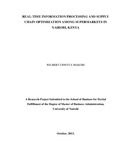| dc.description.abstract | Real-time information processing is a management slogan that is spreading across organizations like bush fire. Some companies have implemented the use of real-time information processing and have reaped from what they sowed. The study was conducted to find out the types of real-time information processing used by supermarkets in Nairobi, Kenya, to determine the benefits of real-time information processing and to establish the relationship between real-time information processing and supply chain optimization. The research adopted a descriptive cross-sectional survey of supermarkets operating in Nairobi, Kenya. The descriptive approach was used to try to find out the types of real-time information processing technology used in the supermarkets and the benefits of real-time information processing. A sample size of 50 respondents was drawn from a list of 105 supermarkets. Data was collected from the field through use of questionnaires and then analyzed using SPSS and presented in tables and figures. The study revealed that all supermarkets in Nairobi, Kenya, use real-time information processing technology with the following technologies in use: barcodes, mobile phones, internet, RFID, and GPS. The study indicated that two major benefits are accrued through the use of real-time information processing. These are: improved inventory management and increased supply chain visibility and reduction in labor costs. The findings also indicate mixed relationships between real-time information processing and various supply chain optimization indicators. There was a significant positive relationship between real-time information processing and inventory turnover, ROSCI and number of warranty claims. However, there was no significant relationship between real-time information processing and other indicators. This include: warehousing cost, number of orders with complaints, number of customer complaints, transport cost number of accidents, number of times data malfunctioned among others. The study recommends that supermarkets need to train their staff on the use of these technologies for them to reap maximum benefits. The study also recommends the increase in the use of mobile phones, RFID and internet since they had significant relationship with inventory turnover, ROSCI and number of warranty claims. | en |

